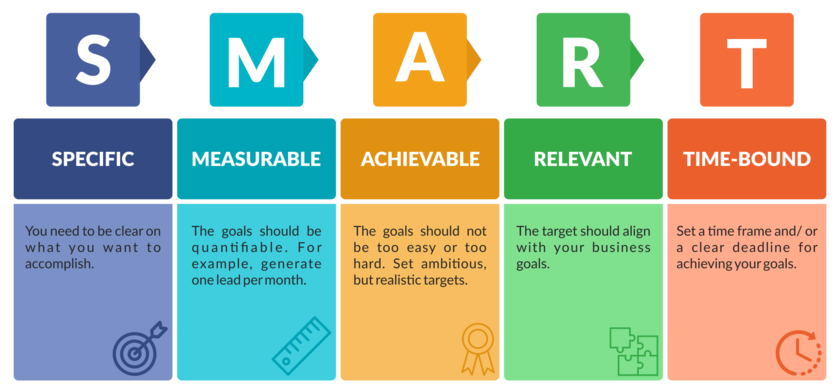8 Tips for Setting and Achieving SMART Goals Perfectly
If you’re looking for tips on how to set and achieve SMART goals, you’ve come to the right place. This article will give you 10 tips on how to set and achieve SMART goals for your business to succeed.
The SMART goals are specific, measurable, attainable, relevant, and time-bound goals. In order to set and achieve the SMART goals, you need to have a clear understanding of what you want to achieve and why it’s important to you. You also need to be realistic about what you can achieve in the time frame that you have set.
Setting goals is critical to any successful plan, yet many people don’t know how to set them effectively. Let’s discuss it.

1. Be specific about what you want to achieve.
When it comes to setting goals, it’s important to be specific about what you want to achieve. The more specific you are, the easier it will be to measure your progress and stay on track.
Here are a few tips to help you get started:
1. Start by brainstorming a list of potential goals.
2. For each goal, ask yourself how you can make it more specific.
3. Once you have a specific goal in mind, break it down into smaller steps that you can take to achieve it.
2. Make sure your goal is achievable

When it comes to setting goals, it’s important to make sure they are achievable. There’s no point in setting a goal that you can’t actually accomplish.
Make sure your goal is realistic. It’s important to set a goal that you can actually accomplish. If your goal is too ambitious, you’re less likely to achieve it.
Challenge yourself but be realistic. Setting unrealistic goals can lead to discouragement and frustration.
Create a plan of action. Once you have a goal, it’s important to create a plan of how you’re going to achieve it.
3. Set a deadline for yourself

Having a timeline will help you stay focused and motivated to achieve your goal.
No matter what your goal is, big or small, having a timeline for when you want to achieve it is a key step in actually making it happen. This is because a timeline creates a sense of urgency and forces you to stay focused on the task at hand.
Without a timeline, it’s easy to get sidetracked or push off your goal until “someday.” But by setting a specific date for when you want to achieve your goal, you’re more likely to stay motivated and on track.
So if you’re looking to set the SMART goals, be sure to include a timeline as part of your plan. This will help ensure that you don’t get bogged down along the way and give up on your goal before you reach the finish line.
4. Write down your goal

One key factor that is often overlooked when setting goals is writing them down. This will help you keep your goals in mind and make them more concrete. If you have a written goal, you are more likely to achieve it than if you simply keep your goal in your head.
Setting goals is an important first step in achieving success. But simply writing down a goal is not enough.
5. Share your goal with others

In order to have SMART goals, it’s important to share your goal with others. Here are a few reasons why:
1. It can help you stay accountable. When you tell someone else about your goal, you’re more likely to stick to it because you don’t want to let them down.
2. It can provide motivation. Knowing that someone else is rooting for you and wants to see you succeed can be a great motivator when things get tough.
3. It can help you get feedback and advice. If you tell others about your goals, they may be able to offer helpful advice or feedback that you wouldn’t have otherwise received.
So if you’re serious about achieving your goals, tell others about them!
6. Set relevant goals

Make sure your goals are aligned with your overall mission or purpose. This will help you stay focused on what’s important.
By taking the time to set relevant goals, you can ensure that your efforts are aligned with your overall mission or purpose. This will help you stay focused on what’s important and help you achieve success.
Take small steps each day to move closer to your goal. If it’s a long-term goal, break it down into smaller steps. This will help you stay motivated and focused on the tasks that need to be completed. You can use time-tracking software to help you visualize your progress and better estimate the time needed to finish each project.
Persist when faced with setbacks or challenges. If you’re working towards a goal, don’t give up when things don’t go exactly as planned. You’ll inevitably encounter obstacles along the way. How you deal with these challenges will determine whether you achieve your goal or not.
7. Make your goals measurable

Establish concrete criteria for measuring progress and success. This will help you track your progress and stay motivated.
By doing this, you increase your chances of not only achieving your goals but also staying motivated throughout the process.
One way to make your goals more SMART is to establish concrete criteria for measuring progress and success. This will help you track your progress and see how far you’ve come, which can be a great motivator. It can also help you identify any roadblocks or areas where you may need to adjust your approach.
8. Measure your goal by Conversion Rate

When it comes to setting and achieving goals, it’s important to make sure you’re measuring the right thing. For many people, that means focusing on the conversion rate. Here are some tips for setting and achieving goals with a focus on conversion rate:
1. Define your goal in terms of conversion rate. What percentage of visitors do you want to convert into leads or customers?
2. Set a realistic goal. If your current conversion rate is 1%, shooting for 10% may be unrealistic. A more achievable goal might be to double your conversion rate.
3. Track your progress over time. Use analytics tools to track your conversion rate over time so you can see if you’re making progress towards your goal.
4. Make changes to improve your conversion rate. Use analytics and experimentation tools to identify changes that can improve your conversion rate.
So what makes a good measure? It depends on your SMART goals, but some things to consider include frequency (e.g. daily, weekly, monthly), quantity (e.g. number of items sold, number of new clients), quality (e.g. satisfaction, time to completion), and the monetary value of each conversion.
Conclusion: The importance of setting goals

When it comes to setting goals, it is important to make sure they are SMART goals. SMART stands for specific, measurable, attainable, relevant, and time-based. By following these simple tips, you can set and achieve any goal you have in mind.
It is also important to keep your goals in mind throughout the entire process. This means setting a deadline for yourself and sticking to it. Make sure your goal is something you can realistically achieve within the timeframe you have set.
It is also essential to make sure your goals are relevant to your overall life plan. There is no point in setting a goal that does not fit into your larger picture. Make sure your goals are something you are passionate about and will help you move closer to your long-term vision.
Finally, do not forget to celebrate your accomplishments along the way! All these steps can improve your business immediately, and set your goals wisely.
If you like these SMART goals, please help me share them with other audiences too, much appreciate it. Thank you for reading, if you have some ideas please leave me a comment.




